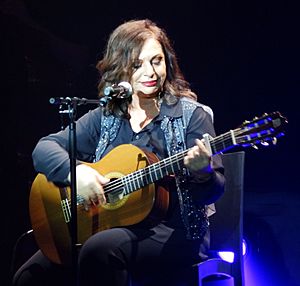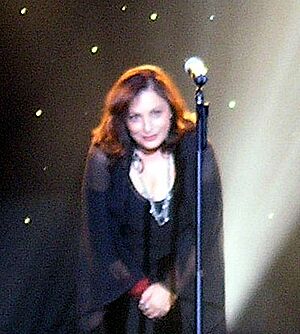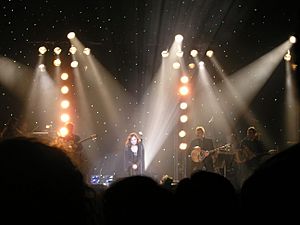Haris Alexiou facts for kids
Quick facts for kids
Haris Alexiou
Χάρις Αλεξίου |
|
|---|---|

Haris Alexiou performing in 2014
|
|
| Background information | |
| Birth name | Hariklia Roupaka |
| Born | 27 December 1950 Thebes, Greece |
| Genres | Folk, rebetiko, laiko, entehno |
| Occupation(s) | Singer, songwriter, composer, actress |
| Years active |
|
| Labels | Minos (1970–1992) PolyGram Greece (1992–2000) Estia (Sony Music Greece) (2000-2002) Estia (Minos EMI) (2002–2020) |
Haris Alexiou (Greek: Χάρις Αλεξίου) is a famous Greek singer. She was born on December 27, 1950, in Thebes, Greece. Her real name is Hariklia Roupaka. Haris Alexiou has been singing for over 50 years! She is one of the most loved singers in Greece.
She has worked with many important Greek songwriters. She has also performed in big theaters all over the world. Haris Alexiou has won many awards for her music. She has recorded more than thirty albums. She has also sung on albums by other musicians.
In 2010, she was named the top-selling female artist in Greece. This was for music released since 1960. She is the highest-selling Greek female artist ever. She is the third highest-selling artist overall. Eight of her albums sold 1.5 million copies. No other Greek female artist has done this.
Haris Alexiou is also very popular in Turkey. Many of her songs have been sung in Turkish. For example, "Ola Se Thimizoun" became "Olmasa Mektubun". "Teli Teli Teli" became "Telli Telli". "Pes Mou Pos Ginetai" became "Maskeli Balo". "Mia Pista Apo Fosforo" became "Her şeyi yak". "Krata Gia To Telos" became "Sebahat Abla". "Fevgo" became "Durma Yağmur".
She has lived in Athens since 1958. Her family moved there from Thebes. Her grandmother's family came to Thebes in 1924. They came from Smyrna. A street in Gaziemir, Turkey, is named after her.
Contents
About Haris Alexiou
Haris Alexiou has said her family has different roots. Her father's side is from Arvanite people. Her mother's side is from Anatolian Greek people.
She started her music career in the early 1970s. People quickly loved her voice. She had a special way of performing. She also had a strong presence on stage. This helped her become a top singer very fast. She has worked with the most important Greek songwriters. She has performed in major theaters on all five continents. She has also received many important awards.
Haris Alexiou has recorded over 30 albums. She has also appeared on albums by other artists. These include both famous and new singers. She is always open to new music styles.
Early Career: The 1970s
A big step in her career was in 1972. She sang with George Dalaras on the album Mikra Asia (Asia Minor). Apostolos Kaldaras wrote the music. Pythagoras wrote the lyrics. This album was a huge hit in the 1970s. It is one of the "100 Greatest Hits of the Century."
In 1973, Haris Alexiou sang on other albums. These included Kalimera ilie (Good Morning, Sun). This album was by Manos Loïzos and Lefteris Papadopoulos. She also sang on Byzantinos Esperinos and Odos Aristotelous. Meeting Manos Loïzos was very important. They became lifelong friends. They also worked together on many successful projects.
In 1975, she released her first solo album. It was called 12 'Laika' Songs. One song, "Dimitroula," became a classic. It was first sung in the 1930s by Roza Eskenazi. In the same year, she started performing in small music clubs. This was a new way to present songs. It was different from big nightclubs. This was after the military government ended. It was a time for political songs. Old "rebetika" songs also became popular again. Alexiou sang many types of songs. She sang traditional, modern, folk, and rebetika songs.
For many years, she worked with other famous singers. These included George Dalaras, Dimitra Galani, Vasilis Papakonstantinou, and Yiannis Parios. Her concerts were very popular. She sang songs by Manos Loïzos, Theodorakis, and others. Her fame grew very quickly. People started calling her "Haroula of Greece."
In 1979, she released Ta tragoudia tis Haroulas (Haroula's Songs). Manos Loïzos wrote the music. Manolis Rasoulis and Pythagoras wrote the lyrics. The song "o Fantaros" ("The Soldier") became a big hit. "Ola se thymizoun" ("All Things Remind Me of You") is a very beautiful Greek ballad.
Success in the 1980s
The 1980s began with two huge hit songs. These were "Fevgo" ("I'm Leaving") and "Ximeroni" ("The Day Breaks"). Her album Songs of Yesterday with Dimitra Galani had lovely ballads. At the same time, she recorded traditional and folk songs. She also sang rebetika and laika songs. She gave concerts in Greece and other countries.
In 1983, she recorded Tsilika. This album had rebetika songs from 1900 to 1935. It is a special album for collectors.
In 1986, she worked with composer Thanos Mikroutsikos for the first time. Their album was I Agapi ine zali (Dizzy with Love). The title song was a massive hit. "Eleni" and "Erotikon" from the same album were also very successful. That same year, Haroula became popular in France. She performed in "Théâtre de la Ville." The French newspapers gave her great reviews. After that, she performed in Cyprus, Tunisia, Germany, and many Greek towns.
In 1987, the famous Greek composer Manos Hadjidakis invited her to sing. She performed in his club "Sirius." He guided her and later recorded with her. In the summer, she sang in Hadjidakis's concerts. These were held in many Greek towns.
In 1988, she worked with "Fatme." This was a group of young, talented artists. She also worked with Paolo Conte. He is a well-known Italian singer. They performed together in Athens. She recorded two of his songs with Greek lyrics.
In 1989, she started "The Show Begins." This was a musical show. She performed it for two years. She was with Dimitra Galani and Yiannis Parios. They performed in Athens and Thessaloniki. An album with the same name came from this show.
The 1990s and Beyond
In 1990, she worked with Thanos Mikroutsikos again. The album was This Cologne Lingers on for Years. Lina Nikolakopoulou wrote the lyrics. In October, she sang in a big concert in Athens. Many famous Greek artists were there.
In 1991, she performed a special show. It was called "In Three Acts." She sang songs by different composers. She also presented her own songs. She then took this show to the State Theatre of Northern Greece. This was the first time a Greek singer performed there. Her concerts set new standards. They used modern sound and lighting. They also had amazing stage designs.
In autumn 1991, she performed with Costas Hadjis. The show was directed by Mauro Bolognini. An album called Alexiou Sings Hadjis followed this show.
In 1992, she started working with PolyGram. She brought a new style to her songs. The album Di' efchon (L'orale) was very fresh. It gave new energy to her long career. In 1993, this album was released in other countries. These included Japan, Belgium, France, and Israel. A French TV channel filmed her concert in Athens. That same year, she toured the world. She gave concerts in Cyprus, the US, Canada, Israel, and Europe. She ended her tour in Paris.
In 1994, her album Hey! was released. In the summer, she performed in the Odeon of Herodes Atticus. This show was also directed by Mauro Bolognini. In October, she had a very successful performance in Japan.
In 1995, the album 88 Nefelis Street came out. She wrote all the songs for this album. In April 1995, she received the Prix Adami award in Paris. This award is given to special artists each year. The same year, she opened Studio Nefeli. She presented her new songs there. It was a new kind of "Cafe Theatre."
In 1996, she wrote lyrics for "Nefeli's Tango." This song was on Loreena McKennitt's music. This song was included in her album Around the World '92-'96. "Nefeli's Tango" was one of the top World Music songs in Europe for months.
In summer 1997, she gave a concert at Pnyka Hill. This was near the Acropolis. It was for the Olympic Games Committee. The concert was so popular she had to repeat it twice.
1998 was the year of The Game of Love. This was her second album with only her own songs. She recorded it in Paris. She used Greek and foreign musicians. That year, she toured North and South America. She performed with Nikos Papazoglou. In December, she performed in Athens. The show was directed by Dimitris Papaioannou again.
In October 1999, she sang with Turkish singer Sezen Aksu. They sang in Athens and Istanbul. This was to help victims of earthquakes in both countries. They sang together again in 2000 in Istanbul and İzmir.
2000 to Present Day
In September 2000, the album Whispers was released. It had her favorite songs. She sang them with only a piano. In October, she performed these songs in the Athens Concert Hall. She also sang in the ancient Epidaurus Odeon. She was joined by a small music group.
That same year, she started her own record company, Estia. This was to produce her future music. In December, she released Strange Light. On this album, she worked with old songwriters again. Strange Light became Lumiere Etrange in Europe. Haroula toured Europe. She gave concerts in famous theaters. She won over both audiences and critics. Her tour ended with a big show in Paris.
2002 was another busy year for Haroula. She performed at the Keramikos Music Hall. This time she sang more "laika" songs. Lavrentis Macheritsas and other young artists joined her. The album Keramikos Live came from this show.
In 2003, her album To the end of your heaven sold very well. It went quadruple platinum. The World Music Awards gave Haris Alexiou an award. She was the Best-Selling Greek Artist for 2003-2004.
In 2004, the Olympic Games were in Athens. Haris Alexiou sang at the closing ceremony. She sang with other famous artists. In October 2004, a collection album was released. It was called Anthology. This double CD had 38 songs from her past albums. It also had two new songs. Alexiou chose the songs herself. She picked popular ones and those important to her.
In April 2005, her 16 albums were re-released. They were improved and repackaged. The new versions had lyrics, information, and old photos.
In 2006, Haris Alexiou released Sour cherry and bitter orange. This album showed traditional music in a new way. It became a platinum album. People loved it very much.
That summer, she gave special performances. She sang with Dimitra Galani. They gave two concerts for Sofia Vembo. These were at the Odeon of Herodes Atticus. She also gave four sold-out concerts. She sang with Sokratis Malamas and Alkinoos Ioannidis. These celebrated a radio station's 25 years. These concerts were recorded. A double CD and DVD were released in 2007.
In late 2006, Haris Alexiou toured Europe. She gave many concerts. She promoted her album Anthology internationally.
In early 2007, she performed five concerts in Athens. The songs were arranged by Kostas Papadoukas. Alexiou gave three concerts for Manos Loizos. These were at the Odeon of Herodes Atticus in June 2007. They celebrated his 70th birthday. Two more concerts were in Thessaloniki. Then she toured Greece and Cyprus. On October 22, the album Haris Alexiou - A tribute to Manos Loizos was released. It had live recordings from the concerts.
Haris Alexiou travels all over the world. She goes from Greece to Australia. From Russia to Africa, and America to Japan. She shares the feelings of Greek songs with the world. She believes Greek songs helped her understand her country's history and culture.
Since late 2022, Alexiou has also been acting. She plays the grandmother Haris. This is in the Greek TV series Maestro in Blue. It is shown on Mega Channel in Greece. It is also on Netflix worldwide.
Music Albums
Haris Alexiou has released many albums throughout her long career. These include both solo albums and collaborations with other artists.
- Collaborations:
- Mikra Asia (1972) with George Dalaras
- Byzantinos Esperinos (1973) with George Dalaras
- Kalimera Ilie (1974) by Manos Loizos
- Solo Albums:
- 12 Laika Tragoudia (1975) - Her first solo album.
- Ta Tragoudia Tis Haroulas (1979) - A very popular album with Manos Loizos.
- I Agapi Einai Zali (1986) - A big hit album with Thanos Mikroutsikos.
- Di'Efhon (1992) - A new style for her music.
- Odos Nefelis '88 (1995) - She wrote all the songs on this album.
- To Paihnidi Tis Agapis (1998) - Another album where she wrote all the songs.
- Os Tin Akri Tou Ouranou Sou (2003) - This album sold very well and won an award.
- Vissino Kai Nerantzi (2006) - A popular album with traditional sounds.
- Afieroma Sto Mano Loizo (2007) - A live album tribute to Manos Loizos.
Haris Alexiou has received many awards for her music. Many of her albums have sold enough copies to be certified Gold or Platinum. This means they sold tens of thousands of copies or more. Her music continues to be loved by many people.
See also
 In Spanish: Cháris Alexíou para niños
In Spanish: Cháris Alexíou para niños
 | Valerie Thomas |
 | Frederick McKinley Jones |
 | George Edward Alcorn Jr. |
 | Thomas Mensah |



